|
|
|
Sort Order |
|
|
|
Items / Page
|
|
|
|
|
|
|
| Srl | Item |
| 1 |
ID:
151378


|
|
|
| 2 |
ID:
131723
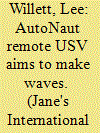

|
|
|
|
|
| Publication |
2014.
|
| Summary/Abstract |
UK based most autonomous vessels (AV) has demonstrated AutoNaut, it new wave-powered unmanned surface vessels (USV), developed as a long - endurance, low signature, autonomous monitoring and surveillance platform.
|
|
|
|
|
|
|
|
|
|
|
|
|
|
|
|
| 3 |
ID:
128330
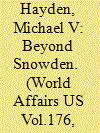

|
|
|
|
|
| Publication |
2014.
|
| Summary/Abstract |
The October 10, 2013, edition of many American papers featured a photo of fugitive NSA contractor Edward Snowden in Russia, surrounded by former NSA executive Thomas Drake, former FBI agent Coleen Rowley, and former CIA analyst Ray McGovern. The three former government officials were in Russia to present Snowden with something called the Sam Adams Award for Integrity in Intelligence. All three had previously won the award themselves, along with WikiLeaks founder Julian Assange and Katharine Gun, a translator for the British intelligence agency GCHQ who alleged NSA plans to tap the communications of UN members in the run-up to the Iraq War.
|
|
|
|
|
|
|
|
|
|
|
|
|
|
|
|
| 4 |
ID:
134060
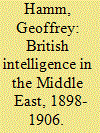

|
|
|
|
|
| Publication |
2014.
|
| Summary/Abstract |
This article examines British intelligence efforts in Turkish Arabia at the turn of the twentieth century. It argues that intelligence collection was really three separate efforts, carried out by the War Office, the Foreign Office, and the Government of India, and it reflected concerns about British decline, the problems experienced during the Boer War, as well as an effort to penetrate the 'information order' of India's sub-empire. Although intelligence efforts suffered from bureaucratic disharmony in Whitehall, and between London and the Government of India, valuable contributions were nevertheless made to Britain's knowledge of Turkish Arabia.
|
|
|
|
|
|
|
|
|
|
|
|
|
|
|
|
| 5 |
ID:
132436
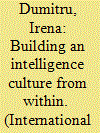

|
|
|
|
|
| Publication |
2014.
|
| Summary/Abstract |
Collective perceptions on intelligence services have been for centuries associated with a sense of mystery, obscurity, and clandestine behavior. At the same time, intelligence success could not be traditionally conceived and exercised in the absence of cover, duplicity, truth manipulation, and intentional avoidance, as well as of masks adapted to context. Therefore, intelligence would traditionally be based on secrecy and a mainly "no communication" approach. Thus, secrecy inherently marked intelligence, as both a barrier created from inside the organization towards the outside world and as a label placed by public opinion on the intelligence organization, therefore shaping knowledge of what cannot otherwise be known.
|
|
|
|
|
|
|
|
|
|
|
|
|
|
|
|
| 6 |
ID:
192658
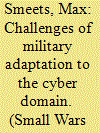

|
|
|
|
|
| Summary/Abstract |
Whilst NATO speaks increasingly publicly about the military use of cyber operations, adaptation to the cyber domain has reportedly been challenging for most militaries. Little research has sought to understand the nature of these challenges. This study seeks to address this gap through a case study of the Netherlands. By utilizing a range of primary and secondary sources, this article reveals that the Dutch Defense Cyber Command has faced significant constraints in its adaptation to the cyber domain, primarily due to issues related to organizational structure, operational mandate, and the availability of skills and resources. A cyber command that lacks regular opportunities for day-to-day operations and where personnel may not have continuous learning opportunities to acquire and refine their skills will encounter difficulties in recruiting, training, and retaining a proficient workforce. These findings highlight the tendency of observers to mistakenly equate the mere establishment of a cyber command with the existence of a robust military cyber capability – namely, the ability to effectively carry out and sustain a range of cyber operations for tactical or strategic purposes.
|
|
|
|
|
|
|
|
|
|
|
|
|
|
|
|
| 7 |
ID:
132420
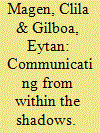

|
|
|
|
|
| Publication |
2014.
|
| Summary/Abstract |
Communicating with the media is an ongoing complicated task intelligence services tackle from the day they are established. The relationship is inherently tense because one side wishes to reveal what the other wishes to conceal, highlighting the constant contradiction between two major principles: the public's right to know versus the government's duty to protect national security. Reconciling these two principles becomes exceedingly complex during crisis situations because both the media and the public demand to know what is happening and why, whereas intelligence services can offer only limited and often incomplete information, a limitation imposed by the need to protect vital secrets. Moreover, the services frequently face a quandary: they are innately secretive and cannot advertise their accomplishments and successes, but these are commonly exposed when they fail. This distorts the natural balance other organizations are generally able to maintain between failures and achievements and any publicity about them.
|
|
|
|
|
|
|
|
|
|
|
|
|
|
|
|
| 8 |
ID:
132424
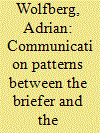

|
|
|
|
|
| Publication |
2014.
|
| Summary/Abstract |
Intelligence professionals called "briefers" provide intelligence information on a daily basis to senior civilian policymakers. Herein is a description of what actually takes place prior to, during, and after the face-to-face interaction. While a body of work exists on presidential briefings, this assessment is unique because it deals with the process of transferring knowledge to policymakers, and specifically from the briefer's perspective. Individuals from the outside, and even intelligence officers or others who have studied intelligence but have not been "briefers," might find some of this material fascinating, yet possibly hard to believe. But those who have been "briefers" will find that this mostly validates their experience."
|
|
|
|
|
|
|
|
|
|
|
|
|
|
|
|
| 9 |
ID:
132889
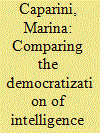

|
|
|
|
|
| Publication |
2014.
|
| Summary/Abstract |
This article discusses the reform of intelligence governance in two sub-regional groupings of former communist states: East Central Europe and the Balkans. These two sub-regions are delineated according to the pace and nature of transformations that they have undergone since the collapse of communist rule and their relations with respect to the European Union, the key political and economic organization in Europe. A number of lessons are drawn from comparing experiences in the two sub-regions relating to democratic reform of the security apparatus, and in particular the intelligence sector. Significant factors in the consolidation of democratic governance of intelligence include the nature of precursor communist-era regimes and the legacies they created, whether armed conflict has occurred during the transition, the extent and character of external (especially EU) assistance, and the strength of media and civil society. These factors appear to have influenced how transitional regimes have sought to introduce institutional reforms to constrain the powers of those services and their susceptibility to arbitrary use. They also have influenced measures taken to redress abuses by intelligence services under the preceding communist regime and the legitimation of the post-authoritarian state.
|
|
|
|
|
|
|
|
|
|
|
|
|
|
|
|
| 10 |
ID:
133420
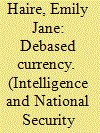

|
|
|
|
|
| Publication |
2014.
|
| Summary/Abstract |
Using memoirs can be a vital way of supplementing archival evidence or indeed of overcoming a shortage of contemporaneous sources, and they offer insights into the attitudes and motivations of participants as well as how they recorded and remembered events. Memoirs retain an inherent value that must not be ignored, particularly in the study of intelligence liaison which addresses the kinds of personal and cultural aspects which are often especially well illuminated through autobiographical writing. This paper explores some of the theoretical and practical issues associated with the use of memoir material and examines them through the prism of selected autobiographical writings related to Anglo-French intelligence liaison from the Great War up to the Second World War.
|
|
|
|
|
|
|
|
|
|
|
|
|
|
|
|
| 11 |
ID:
099822
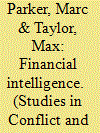

|
|
|
|
|
| Publication |
2010.
|
| Summary/Abstract |
The harvesting of financial intelligence by law enforcement and intelligence services through various forms of surveillance is now so prevalent that it has become a core feature of contemporary security practice. Not surprisingly, concerns have been raised regarding the intrusive nature of financial intelligence collection and the emerging challenges posed to liberty. This article, whilst written primarily from a UK perspective, considers the trade-offs that inevitably emerge when liberty and security collide. Above all it argues that such measures are a necessary consequence of a changing security environment and that effective counter measures inevitably come at a price. The value added from data surveillance by the state, when lawfully sanctioned, audited and regulated are in the interests of public safety and national security, deemed a price worth paying.
|
|
|
|
|
|
|
|
|
|
|
|
|
|
|
|
| 12 |
ID:
133219
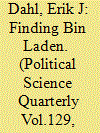

|
|
|
|
|
| Publication |
2014.
|
| Summary/Abstract |
MUCH OF THE DISCUSSION ABOUT THE HUNT FOR and killing of Osama bin Laden has focused on the remarkable abilities of the U.S. Special Operations Forces who carried out the raid. Accounts by journalists and others revealed more than was previously known about the Navy SEALs who were involved, and sparked complaints by critics that the Barack Obama administration had leaked sensitive information in order to portray its own actions in a positive light.1 Terrorism experts have debated whether the killing would weaken al Qaeda, and what it would mean for the future of international terrorism.2 And other scholars and analysts have considered what the story of bin Laden's death reveals about American national security and foreign policy decision making. Graham Allison, for example, writes that "this case demonstrates that the U.S. government is capable of extraordinary performance in extraordinary circumstances.
|
|
|
|
|
|
|
|
|
|
|
|
|
|
|
|
| 13 |
ID:
095125
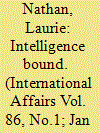

|
|
|
|
|
| Publication |
2010.
|
| Summary/Abstract |
This article explores the functions and impact of the South African constitution in relation to the country's intelligence services. The constitution has proved to be a powerful instrument for transforming, controlling and constraining the services, safeguarding human rights and contributing to the management of political conflicts and crises. Yet the constitution's relevance for the intelligence community is also contested and contradictory. Paradoxically, the executive, parliament and the intelligence services believe that it is legitimate for the services to deviate from constitutional provisions because their mandate to identify and counter threats to national security is intended to protect the constitution. The article contributes to filling a gap in the literature on security sector reform, which is concerned with democratic governance but ignores the role of a constitution in regulating the security organizations and determining the nature of their governance arrangements. Intelligence agencies around the world have special powers that permit them to operate with a high level of secrecy and acquire confidential information through the use of intrusive measures. Politicians and intelligence officers can abuse these powers to manipulate the political process, infringe the rights of citizens and subvert democracy. While a constitution cannot eliminate these risks, it can establish an overarching vision, a set of principles and rules and a range of mechanisms for promoting intelligence transformation and adherence to democratic norms.
|
|
|
|
|
|
|
|
|
|
|
|
|
|
|
|
| 14 |
ID:
146423
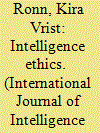

|
|
|
|
|
| Summary/Abstract |
A spotlight has been placed on the conduct of intelligence activities pertaining to the revelations of controversial intelligence affairs (i.e., dubious methods of interrogation, such as those used at the Guantánamo Bay detention facility; the comprehensive intelligence gathering conducted by NSA, and more). As a result, the number of scholars and intelligence practitioners concerned with intelligence ethics and with the moral justifiability of the activities conducted by intelligence services has increased.1 While the issue of intelligence ethics is now present in various scholarly debates, especially in the domain of Intelligence Studies, very little attention is being drawn to developing core understanding of the concept. Also, intelligence ethics is neither homogeneous nor yet embedded as a solid research field.
|
|
|
|
|
|
|
|
|
|
|
|
|
|
|
|
| 15 |
ID:
155380
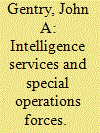

|
|
|
|
|
| Summary/Abstract |
Special operations forces (SOF) typically are small, relatively light-armed forces that rely on both their skills, and the stealth and surprise generated largely through intelligence support, to conduct strategically important missions that are often covert or clandestine. The SOF often rely heavily on national civilian as well as military intelligence agencies. Their use in sensitive operations typically requires senior-level political confidence in SOF and a domestic political climate that accepts special operations as legitimate instruments of national policy.1 Colin S. Gray, “Handfuls of Heroes on Desperate Ventures: When do Special Operations Succeed?” Parameters, Vol. 29, No. 1, Spring 1999, pp. 2–24.
[Google Scholar]
The major intelligence services also conduct “covert action” missions—plausibly deniable activities authorized by national political leaders—for strategically important reasons when other policy options are unavailable or unattractive. These activities occasionally involve the use of force by capable, specialized armed forces that are component parts of the agencies.
|
|
|
|
|
|
|
|
|
|
|
|
|
|
|
|
| 16 |
ID:
116158
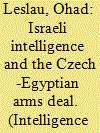

|
|
|
|
|
| Publication |
2012.
|
| Summary/Abstract |
This article uses records, recently made available, to shed new light on the way Israeli intelligence evaluated and interpreted the political and military implications of the Czech-Egyptian arms deal (1955). The evidence suggests that the intelligence services did not have the capabilities to cope with such an event. For the first two months following public exposure of the deal, intelligence was not able to present a coherent and evidence-based description regarding the extent of the deal and its implications. Subsequently, their assessment of the deal's implications evolved from gloomy and anxious to calm and reassuring. Causes of the intelligence service's difficulties in evaluating the situation's effects and the role of their assessment in shaping Israeli policy are discussed.
|
|
|
|
|
|
|
|
|
|
|
|
|
|
|
|
| 17 |
ID:
030021
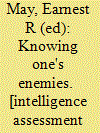

|
|
|
|
|
| Publication |
Princeton, Princeton University Press, 1984.
|
| Description |
xiii, 561p.
|
| Contents |
Part1: The first World War
Part2: The second World war, Western Europe
Part3: The second World war, eastern Europe and beyond
|
| Standard Number |
0691047170
|
|
|
|
|
|
|
|
|
|
|
|
Copies: C:1/I:0,R:0,Q:0
Circulation
| Accession# | Call# | Current Location | Status | Policy | Location |
| 025498 | 327.12/KNO 025498 | Main | On Shelf | General | |
|
|
|
|
| 18 |
ID:
128433
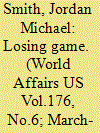

|
|
|
|
|
| Publication |
2014.
|
| Summary/Abstract |
The sentiments of Truman's State Department toward the Middle East are well documented. Hugh Wilford's engaging new book convincingly explores similar sentiments in the early CIA. One of the most famous anecdotes of the Truman administration was first revealed by presidential adviser Clark Clifford in his memoirs. Secretary of State George Marshall and his undersecretary were called into the Oval Office to debate with Clifford the merits of recognizing Israel. After Clifford argued in favor of Israel, Marshall, whom Winston Churchill called the "Organizer of Victory" for his role as army secretary during World War II, made what Clifford called "the most remarkable threat I have ever heard anyone make directly to a president." Said Marshall to Truman: "If you follow Clifford's advice and if I were to vote in the election, I would vote against you. Marshall's stunning comment reflected the viewpoint of "almost every member of the brilliant and now legendary group of presidential advisers, later referred to as the Wise Men, who were then in the process of creating a postwar foreign policy that would endure for more than forty years," recalled Clifford. Those advisers included such luminaries as George Kennan, Dean Acheson, Dean Rusk, and Charles Bohlen. They were later dubbed the "Arabists" because they believed that the Arabs could be allied with America after World War II-and should be courted instead of Israel.
|
|
|
|
|
|
|
|
|
|
|
|
|
|
|
|
| 19 |
ID:
126687
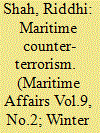

|
|
|
|
|
| Publication |
2013.
|
| Summary/Abstract |
Centre-state relations in India are a fascinating area of studies. The structure of the relationship has an effect on every single aspect of life as we know it in India. This paper is an attempt to study centre-state relations in the context of India's maritime counter-terrorism strategy. Although the Government of India has not publicly stated its counter-terrorism strategy on the sea, intelligence, information sharing, crisis response, finances for internal security and the nation's legislation for battling terrorism together comprise India's maritime-terrorism strategy. Through study of these areas, the paper argues that the centre-state divide has had systemic implications on India's maritime security and has largely done more harm than good to collective initiatives that aspire to prevent future risk of terrorism from the sea or on the sea.
|
|
|
|
|
|
|
|
|
|
|
|
|
|
|
|
| 20 |
ID:
130229
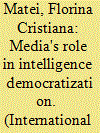

|
|
|
|
|
| Publication |
2014.
|
| Summary/Abstract |
In their path toward democratic consolidation, emerging democracies endeavor to ensure the democratic transfer of political power, bring changes in the legal framework, transform their executive, legislative, and judicial systems, boost free market economy, and develop robust and functional civil societies. They also institutionalize democratic civil-military relations (CMR) by establishing new security institutions-military, police, and intelligence agencies-that are under democratic civilian control, effective, and efficient. Of these many tasks, the democratization of intelligence agencies is by far the most daunting, as effectiveness and efficiency involve secrecy, while democratic control implies transparency, openness, and accountability. Nevertheless, democratic reform of intelligence in new democracies, though difficult, is not impossible, if and when civilians are interested and willing to "invest" in intelligence and intelligence reform. The contribution of external factors, such as media, 2 civil society, international groups, and individuals involved in human rights, may also be instrumental in achieving a balance between control and effectiveness of intelligence
|
|
|
|
|
|
|
|
|
|
|
|
|
|
|
|
|
|
|
|
|